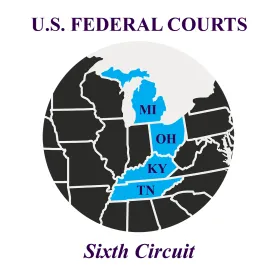As readers of this Blog know, the OSHA vaccine-or-test mandate has occupied much of the Sixth Circuit’s time the past few weeks. That mandate is now before the Supreme Court, which hears oral argument on the OSHA and CMS mandates tomorrow. In the meantime, a third pandemic-era mandate—the federal contractor mandate—made its own splash in the Sixth Circuit yesterday.
That mandate, issued by the Safer Federal Workforce Task Force, requires employees of federal contractors in “covered contracts” to become fully vaccinated against COVID-19. This “contractor mandate” potentially covers roughly one-fifth of the entire U.S. workforce.
Kentucky, Ohio, Tennessee, and two Ohio sheriffs’ offices filed suit in the Eastern District of Kentucky, seeking declaratory and injunctive relief. They argued, among other things, that the Federal Property and Administrative Services Act of 1949 (the “Property Act”) — the basis for the Task Force’s authority — does not allow for such a broad mandate. They also argued that the mandate violates the Administrative Procedure Act, separation of powers, and creates federalism problems.
As readers may know, Judge Van Tatenhove enjoined enforcement of the contractor mandate throughout Kentucky, Ohio, and Tennessee. By the time the federal government sought a stay of that injunction with the Sixth Circuit, another district court in Georgia had already issued a nationwide injunction against the mandate. The Eleventh Circuit would later refuse to stay that injunction. To our knowledge, the Department of Justice has not sought a stay with the Supreme Court for any of these rulings.
Yesterday, the Sixth Circuit essentially agreed with the Eleventh Circuit and refused to stay Judge Van Tatenhove’s injunction. Judge Bush, joined by Judge Suhrheinrich, found that the States and sheriffs’ offices had standing to sue and that the federal government had “established none of the showings required to obtain a stay.” In Judge Bush’s view, the contractor mandate constituted an illicit re-envisioning of the decades-old Property Act’s “uncontroversial purpose” to facilitate the “economical and efficient” purchase of goods and services on behalf of the federal government. Judge Cole penned a short dissent, arguing that neither the States nor the sheriffs’ offices had standing and that the contractor mandate did not exceed the Task Force’s authority under the Property Act.
Given the potential importance of these opinions, we will be doing a deeper dive into both the majority and dissenting opinions in the coming days, so, as always, stay tuned. We will also be posting an argument preview for tomorrow’s Supreme Court argument in the OHSA ETS case.
Alon Farahan contributed to this article.




 />i
/>i

